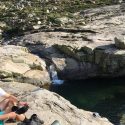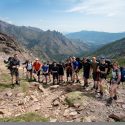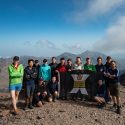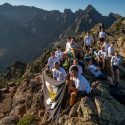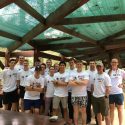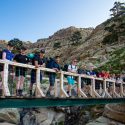Exercise CORSICA CASTLE 2019 was a fantastic 7-day, level three Adventure Training exercise conducted by the City of Edinburgh UOTC over the period 24 August to 01 September 2019, for 12 Officer Cadets and 3 instructors plus a support vehicle. The aim of this exercise was to continue with the leadership training and development of those attending, concentrating on team building, individual self confidence, physical and mental robustness, whilst allowing everyone the opportunity to experience the spectacular Corsican mountains. All of these aims and more were achieved.
The expedition began at the Bergerie de Grotelle where the new tents were taken out of the bags and constructed for the first time. The next day began at 5 am, a tough start for a few, but a necessary early start as we wanted to do the majority of the first day’s climb before the heat of the day. The Officer Cadets immediately saw the nature of the GR20, a tough 1000m climb, past the two beautiful lakes of Melo and Capitello, finishing with a steep ascent up a gully and then on to chains to reach the col. The Refuge de Managu was a welcome sight when it arrived.
One aim of the expedition was to run Distributed training and qualify the Cadets in the Summer Mountain Foundation course. To this end, each evening, a different element of Mountain Leadership was covered. Two Cadet leaders were allocated each day and their responsibility was to brief the group on the following day’s activities. In addition, each cadet was given a topic concerning Corsica and two lecturettes were presented to the group each evening with the objectives of enhancing the group’s knowledge of Corsica and improving the oral presentation skills of the Cadets.
The expedition continued through the picturesque Lac De Nino where wild horses grazed on the pastures and the pozzines (special plant formations specific to alpine Corsica) were admired. We continued towards Vergio where the French foreign Legion have their base and we were lucky enough to have the use of this facility and to enjoy real beds for an evening and hot showers.
The next day the scenery changed from forest back to rocky peaks as we tackled some strenuous, rocky terrain to the Tighettu refuge. With little time to find camping sites before the storm broke, it was quite a challenge to place everyone in the small, rocky refuge.
Day 4 was a strenuous day physically, with a 1000m ascent followed by the same descent again with the added pressure of a potential storm in the early afternoon. We walked to our highest altitude, just below the largest peak in Corsica, Monte Cinto. Despite this being the hardest day physically, the Cadets particularly enjoyed this part, they were used to carrying their packs and the views on either side of the valley were spectacular. The descent off Cinto was long, with rough scree along most of the path. We rejoined the support vehicle here and cooked a large Thai curry in the communal kitchen of the refuge while the rain poured around us.
Leaving the busy station at Asco, it was nice to get back on the path up to Carozzu. We used the time to practice bearings and estimating distances as many of the peaks were visible and the group was walking well. We passed the mountain bridge without issue and were slightly jealous of the sunbathers beside the river. “We’ll dump the bags and come back we thought”. That wasn’t the heaven’s plan as the sky became grey. We were blessed, as we managed to get to the refuge, put our tents up before a large thunder and lightening storm broke above us. We all jumped in our tents and watched at the rivulets became streams under our tents and we hoped they were very waterproof. Most of us remained totally dry thankfully.
This exercise was a brilliant experience for all who took part. It definitely met all the aims of those who put on the event, namely to push the individuals outside of their comfort zone. One quote from a Cadet on the feedback was: “The expedition didn’t quite kill you but made you want to keep going”.
It definitely challenged the Cadets and developed them as future leaders and certainly gave them greater appreciation of outdoor pursuits within a different culture. It would not have been possible without organisations such as the Ulysses Trust, whose generous financial contribution towards the running of this trip, made if very cost effective for the students. The participants, the exercise organiser and the unit as a whole are extremely grateful for the ongoing support provided by the Trust and its board of directors.

